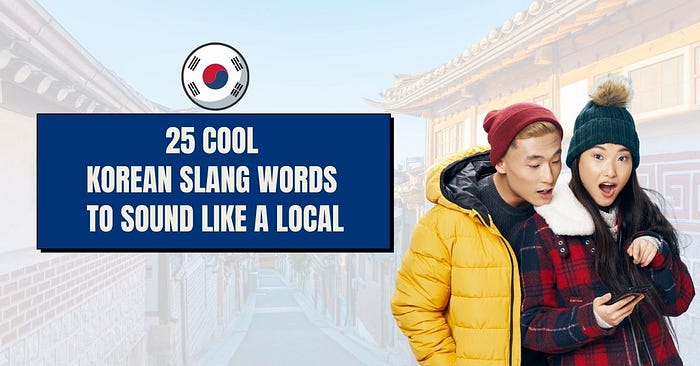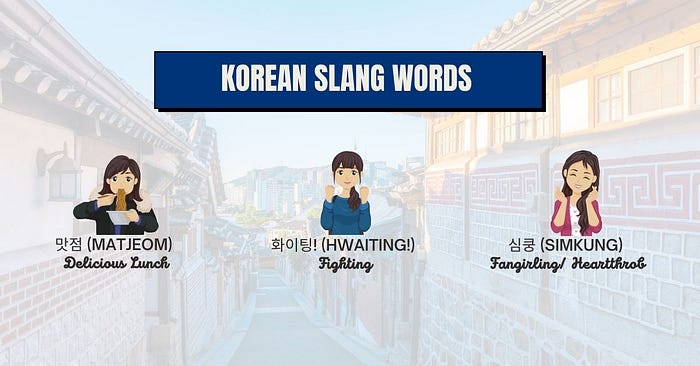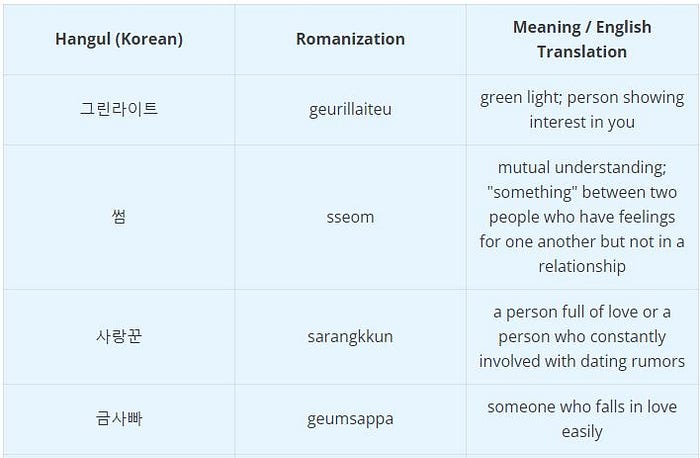25 Cool Korean Slang Words To Sound Like A Local
Original blog post with audio: https://ling-app.com/ko/korean-slang-words/

Hey there, 친구 chingu (friend)! Wanna learn some Korean slang words to make you sound like a native? Cool (짱 jjang)! So, channel your inner Korean now!
Have you tried watching K-dramas, especially rom-coms, and unconsciously learning some Korean terms? 대박 (Dae bak), 화이팅! (Hwaiting!), and 치맥 (Chimaek), these are just a few Korean slang words that you will often hear. If you belong to the younger generation, you will easily get it because of what is circulating on the internet today. If you’re watching K-dramas a lot, it is impossible for you not to pick up any Korean slang term.
These Korean slang words are catchy because of their meaning and the Korean expression locals incorporate. In addition, their tones facial expressions are totally lit; that is why it is hard not to pick up these Korean slang words.
While learning, we are usually drawn to the formal Korean words and phrases; we don’t realize that learning Korean slang terms is just as important. So, in this blog, we will learn Korean slang words that are commonly used in Koran culture. Indeed, you already know some.
What Is A Korean Slang Word?
속어 (Sok-eo) — Slang
Imagine discussing in your class. Then, after that, imagine talking to your friends during recess or lunch break. It is totally different, right? Well, that explains more about Korean slang words. So, let’s learn what a slang word means.
Slang words are very informal words and phrases typically restricted to a particular group of people and context. Slangs are often used in spoken language than in written language. Therefore, Korean slang refers to informal words and phrases in the Korean language that locals or native speakers typically use.
These words are usually modern and trendy. It can be based on the internet, western influences, shortened words, or abbreviation. It is also called “the words on the streets.” With the emergence of messaging apps, shortened version or slightly altered version of a word is commonly used to make it easier to convey your message. Sometimes you’ll also notice that a Korean slang word is derived from an English word. Korean slang words also sound cool because of their trendy nature. Also, the influence of pop culture affects the formation of some Korean slang words.
Why Learn Korean Slang?

Do you want to sound like a native and cool? Do you wanna learn how locals talk to each other in daily conversations? Do you wanna understand some Korean lines in your favorite K-dramas? If your answer is “Yes,” then I encourage you to learn Korean slang words because learning slang words have many benefits.
Understand Casual Conversations
Korean slang words are essential in understanding how people talk in daily and casual conversations. Of course, when you’re in a formal situation, you need to speak Korean using the formal or standard form. But, you’re not always in the workplace, meetings, or any other formal situations. You are usually with your friends, families, or your boyfriend or girlfriend. Using the formal version (unless you have rules) will make it sound weird. But, remember, you can only speak openly using an informal form with your friends or people that are really close to you. That’s how they do it in Korean culture.
Get A Grasp To The Internet Or Street Language
The internet plays a big role in the birth of Korean slang words. South Koreans are known to set trends worldwide. Because of the Korean wave (한류 Hallyu), Korean slang terms have already reached different parts of the world, not just South Korea. Usually, you’ll encounter those Korean Slang words in K-dramas and movies.
Engage In Actual Conversations
The main purpose of learning a language is actually to use it in conversations. This is the most effective way of learning a language, more than just taking a class or course. Korean slang words break the traditional grammar rules to have more comfortable conversations. Since South Koreans do not use formal language most time of the day, learning Korean slang words will help you be part of everyday conversations.
Send Messages Easier
One of the main reasons Korean slang words are formed is their advantages in sending messages through chat or text. When we are texting, we prefer to make it simpler and shorter, so we use the shortened word or the abbreviated word. South Koreans are known for their smartphone in the first place, so it’s no wonder they use Korean slang words in texting or chatting.
Basic Korean Slang Words To Use With Your Korean Friends
Now that you have learned about Korean slang words let us unlock some popular Korean slang words.
대박 (Daebak)
English Translation: Awesome, A big hit, A great success
Have you seen something so amazing? This is the perfect expression for you. 대박 (Daebak) is one of the most used Korean slang words of all time. It can also mean “wow” or “that’s crazy” if you refer to something really awesome.
For example, when Choi Taek in Reply 1988 won the Go-game and became the top player in Korea. Imagine beating players from all over the world? 대박 (Daebak)!
짱 (Jjang)
English Translation: Amazing, Best, Cool
Another Korean slang word that is used to describe something incredible is 짱 (Jjang), which is the second word we will learn. You can use it alone, or you can add some words with it like 몸짱 (momjjang), which means “amazing body.”
One of the most relatable examples, where you can use this Korean slang term, is when you see Nam Joo-hyuk’s body in “Weightlifting Fairy Kim Bok-Joo.” It is indeed 몸짱 (momjjang), nobody can deny.
헐 (Heol)
English Translation: OMG or WTF
This is another one of the most famous Korean slang words you’ll often encounter when watching K-drama. It is an abbreviation for Oh My God, or it can also mean “What The F****.” Either way, it is used for something so unbelievable or surprising. You’ll find this easy because it literally means like the English word.
Do you remember this line from “While You Were Sleeping”? “You hugged me after saving me. Was it at the bus stop? Or, when you bring me the rice cake? Oh my god!” Yes! You can use this slang word in this way. Well, who doesn’t use it nowadays?
화이팅! (Hwaiting!)
English Translation: Fighting
Are you cheering up someone or wishing someone good luck? This is the perfect Korean slang term you can say to your Korean friends. You can say it when someone is nervous about doing something big or someone is having a big break in their life. This is also one of the most used Korean slang terms in K-dramas, Korean TV shows, and movies.
If you want an example of how to do it, take a look at Park Seo-Joon’s way of saying “Fighting” in “Fight For My Way.”
심쿵 (Simkung)
English Translation: Fangirling/ Heartrob
Are you an Army or Blink? If you’re a fan of K-pop idols, you’ll surely have your bias. However, if you’re also a fan of Korean celebrities, you must have binge-watched every K-drama of your favorite actor or actress. Well, don’t worry because there are lots of fangirls or fanboys like you. In fact, they can go overboard by spending too much money on merch and collectibles.
This Korean slang word basically means “heart skips a beat” because 심장 (Sim-Jang) means heart and 쿵쿵 (Kung-Kung) is the sound of your heart. This slang word is best used when you’re fangirling over your crush or a K-pop idol, and I know you definitely know how it feels. Like when An Jeong-Ha’s feelings when she meets Sa Hye-Jun, her all-time idol. Remember the first time they met? She cannot even say his name. Watch it for yourself in “Record of Youth,” and imagine what you’ll feel if you’re in front of your idol.
솔까말 (Solkkamal)
English Translation: TBH
The Korean slang term 솔까말 (Solkkamal) is derived from the Korean phrase “솔직히 까놓고 말해서 (soljiki kkanogo malhaeseo)” or “to be honest with you” in English. It is abbreviated as TBH, and it is usually used in chats or text.

불금 (Bulgeum)
English Translation: TGIF
The Korean slang word TGIF is only an abbreviation of “Thank God It’s Friday.” In the Korean language, it literally means “burning Friday.” But, these Koreans use this Korean slang word when they are thrilled about the upcoming weekend. It has the same meaning in English.
치맥 (Chimaek)
English Translation: Chicken and Beer
소맥 (somaek) — Soju + beer
Koreans also love to do a combination of food or drinks that perfectly fit together, like 치맥 Chikmae. This Korean word came from chi — which means chicken, and maek means beer. I must say, you should try Korean fried chicken. You may think that fried chicken is simple because you can have it in almost every part of the world, but no. Koreans made a twist, and you’ll definitely be wanting more.
For drinks, you can also try the 소맥 (somaek) or the combination of soju and beer.
맛점 (Matjeom)
English Translation: Delicious Lunch
This is one of the most common Korean slang words about food. The Korean word 맛점 (Matjeom) is short for 맛있는 점심 (masinneun jeomsim), which means “delicious lunch.” If if it is dinner time, you can use 맛저 (matjeo) which is short for 맛있는 저녁 (masinneun jeonyeok) or “delicious dinner” in English.
Remember, in Korean culture; it is a polite thing to do to say thank you to someone who prepared the food. It is not just a sign of politeness; it is also a sign of appreciation.
콜 (Kol)
English Translation: Deal!, Sure!, Im in!
You’ll surely get this Korean slang word easily because it came from the English word “call,” which is used to agree or close a deal with someone in an informal way. It can also be used in betting on something that includes agreements.
아싸 (Ah-ssa)
English Translation: Yay!, Oh yeah!
If you wanna express your excitement and happiness over something, this is exactly what you need to learn. You can also use it in winning a bet, even just the small ones.
댓츠 노노 (Daetcheu-nono)
English Translation: That’s no, no
This is another Korean slang word that is derived from English. It came from a popular TV program in Korea, and now, it is used as slang to say “no.”
더럽게 (Deoreopge)
English Translation: Badly
This Korean slang word came from the word 더럽다 | deoreopda, which means “dirtily,” but it is commonly used as badly or something that is extremely negative. For example, the phrases 더럽게 못생기다 (deoreopge motsaenggida) means “really ugly.”
극혐 (Geukyeom)
English Translation: Extreme disgust
If you find something disgusting and you want to express it in Korean slang, you can say 극혐 (Geukyeom). This is the shortened version of 극한의 혐오 (geukanui hyeomo). The first word 극한 (geukan) means “extreme or limit” and the second word 혐오 (hyeomo) means “hatred or disgust.”
남친 (Namchin) And 여친 (Yeochin)
English Translation: Boyfriend / Girlfriend
This is definitely one of the most used Korean slang words in Korea. 남친 (Namchin) and 여친 (Yeochin) are shortened forms of 남자 친구 (namja chingu) which means boyfriend and 여자 친구(yeoja chingu) which means girlfriend.
In Korea, boyfriends and girlfriends are a big deal especially if you’re a celebrity. Today, one of the Power Couples in South Korea is Shin Min Ah and Kim Woo Bin, who will soon make a comeback in the industry.
베프 (Bepeu)
English Translation: Best friend / Best Friend
Everyone needs a best friend, just like how Hye-Jin needs Pyo-Mi-seon in Hometown Cha-Cha-Cha and Lee Gon to Jo Eun-seob in The King: Eternal Monarch. So, a Korean slang word to use to refer to your best friend is 베프 (Bepeu). It is the shortened word for 베스트 프렌드 (beseuteu peurendeu | best friend). You can also use 절친 (jeolchin), which is shortened form of 한 친구 (jeolchinhan chingu), which means “great friend.”
꿀잼 (Kkuljaem) And 노잼 (Nojaem)
English Translation: Fun, funny, or interesting And not fun, funny, or uninteresting
If you have watched the K-drama “My Love From the Star” you’ll be laughing a lot because of the funny scenes, but at the same time, you’ll be interested and curious because it’s about an alien who fell in love with a human. To describe this K-drama, you can say 꿀잼 (Kkuljaem) which means fun, funny, or interesting. The word 꿀 (kkul) means “honey” while the word 잼 (jaem) is short for 재미있어요 (jaemiisseoyo), which means interesting.
On the other hand, the opposite of 꿀잼 (Kkuljaem) is 노잼 (Nojaem). It uses almost the same words, but you’ll notice the word 노 (No), which exactly means “no” or “not.” So it is used to refer to something not funny or not interesting.
만렙 (Mallep) And 쪼렙 (Jjorep)
English Translation: Level 10,000 and Beginner level
Do you remember when Tomato Cultivator was beaten by Desperate Effort in a strategy game? If you understood what I just said, then you might have watched Crash Landing On You. Let me explain the two words above using this context.
Both Captain Ri and Geum Eun-Dong are at the 쪼렙 (Jjorep) beginner level in playing a game. But maybe because of the amount of time Geum Eun-Dong spent in a computer shop, he beat Captain Ri like he was already level 10,000 or 만렙 (Mallep). Take note, Captain Ri has more advanced weapons and items, but still, strategy and experience prevailed or maybe because of the age.
The Korean slang 만렙 (Mallep) came from 만 (man), which means 10, 000 and 레벨 (rebel), which means level. When you combine it together, it means like you’re a pro-player of a game. The opposite of this is the beginner level 쪼렙 (Jjorep) which is short for 쪼그만한 레벨 (jjogeumanhan rebel). Other words for 쪼렙 (Jjorep) are noob or newbs, which newbies in English. Remember, Koreans tend to be competitive in E-sports because it started in South Korea so, you should really practice well before inviting them to any battle.
엄친아 (Eomchina) And 엄친딸 (Eomchinttal)
English Translation: Someone who is good at everything
Do you remember how Ra-Mi-ran is jealous of Sun-Young because Sun-woo is more open with his mom compared to Jung-hwan? Well, Korean parents tend to compare their children to the child of their friends.
The Korean slang 엄친아 (Eomchina or Um chin ah) is short for 엄마친구의 아들 (eommachinguui adeul), which means my mom’s friend’s son. On the other hand, 엄친딸 (Eomchinttal), is short for 마친구의 딸 (eommachinguui ttal), which means my mom’s friend’s daughter
멘붕 (Menbung)
English Translation: Mental breakdown
Have you ever felt like your mind is collapsing because of all the things you are thinking about or the things that pressure you? Well, the word for that is 멘붕 (Menbung). It’s from 멘탈 (mental), which means “mental” and 붕괴 (bunggoe), which means “collapse.” The situation that best describes this feeling is when you suddenly remember that you have a lot to do that needs to be done immediately or maybe even something worse. Well, mental health is something that you really take care especially nowadays.
셀카 (Selka)
English Translation: Selfie
Who doesn’t know this nowadays? Koreans are known to take amazing selfies from OOTDs to high-quality photography by just using their smartphones. The word 셀카 (Selka) came from two words which are 셀프 (selpeu), meaning “self” and 카메라 (kamera) means “camera.” So, it means taking a picture of yourself. There are people who take a lot of selfies and don’t mind posting them on social media. You can have that confidence too!
셀럽 (Selleop)
English Translation: Celebrity
Km Soo-Hyun, Park Seo-Joon, Lee Jong-Suk, Song Hye-Kyo, and Son Ye Jin are just five of the most popular celebrities in South Korea nowadays. Hey, we’re still not talking about the idols. In South Korea, they can also say 연예인 (yeonyein) to refer to celebrities or stars, but 셀럽 (selleop) sounds more cool and trendy.
South Korean celebrities are being recognized all over the world. Just lately, Marvel announced that Park Seo-Joon, a Korean actor, will star at a Marvel film which I think is totally lit.
홧김비용 (Hwatgimbiyong)
English Translation: Impulse Shopping
This phrase refers to buying things without thinking carefully, and who’s our queen for this? Well, it is the one and only Jang Man-Wol in Hotel del Luna. Do you remember how luxurious she is buying cars, clothes, and jewelry pieces without hesitating and thinking about what may happen in the future? This is called 홧김비용 (Hwatgimbiyong).
The word 홧김비용 (Hwatgimbiyong) came from the words 홧김 (hwatgim), which means “to get hot” or “heat of the moment” and 비용 (biyong), which means “cost.” And I think many of us experience buying something because of the heat of the moment and regret it after it cost you too much money.
뻥치지 마 (Ppeongchiji ma)!
English Translation: Don’t lie
Do you have that one friend who always speaks non-sense and lies about different things which you know aren’t true? Well, this is the perfect expression to use. 뻥치지 마 (Ppeongchiji ma)! is short for 뻥 (ppeong) means “lie,” 뻥을 치다 (ppeongeul chida) means “telling a lie” and -지 마 (ji ma) means “don’t.” Remember that it should only be used with your close friends to avoid offending someone. The word 지 마 (ji ma) is the informal version of 지 마세요 (ji maseyo).
케미 (Kemi)
English Translation: Chemistry (the chemistry between two people)
Did you fall in love by just watching Kim Seon-ho and Shin Min-ah in Hometown Cha-cha-cha? Even if you know that they are not a real-life couple, there’s this chemistry between them that makes your heart skip a beat during their romantic and sweet scenes. Just like any other romantic K-drama, the two actors, whether they are not in a relationship, should have chemistry 케미 (Kemi) to make it work. But, this just happens to Korean actors and actresses. It may also happen in real life.
Othe Korean Slang Phrases / Expressions
Did you have fun learning the 25 Korean slang words above? Well, we’re not done yet because there are more. If you wanna sound cool, Korean slangs are the key!
Food And Drinks

People’s Characteristics



Describing Things

Love And Relationships


Moods, Feelings, And Expressions


Entertainment And Internet

Text And Chat


Speak Like A Native! Learn Korean Now!
Do you wanna engage in a conversation using the Korean language? Do you wanna widen your vocabulary and learn Korean words and phrases conveniently? If your answer to both questions is “Yes,” then Ling App is here to back you up. Learning Korean slangs are a good start, but if you wanna go deeper, Ling App has fun and relevant activities for you to improve your Korean language skills!

Backed with linguistic research and spaced repetition system, learning Korean is achievable in no record time. With Ling App, you’ll definitely love the vocabulary feature where you can review all the words and phrases with images, translations, and audio recordings. Learning with Ling App feels like playing a game and feeling happy and motivated is good in learning.
So, from beginner level 쪼렙 (Jjorep), work your way up to level 10, 000 만렙 (Mallep). Start learning Korean with Ling App now!
